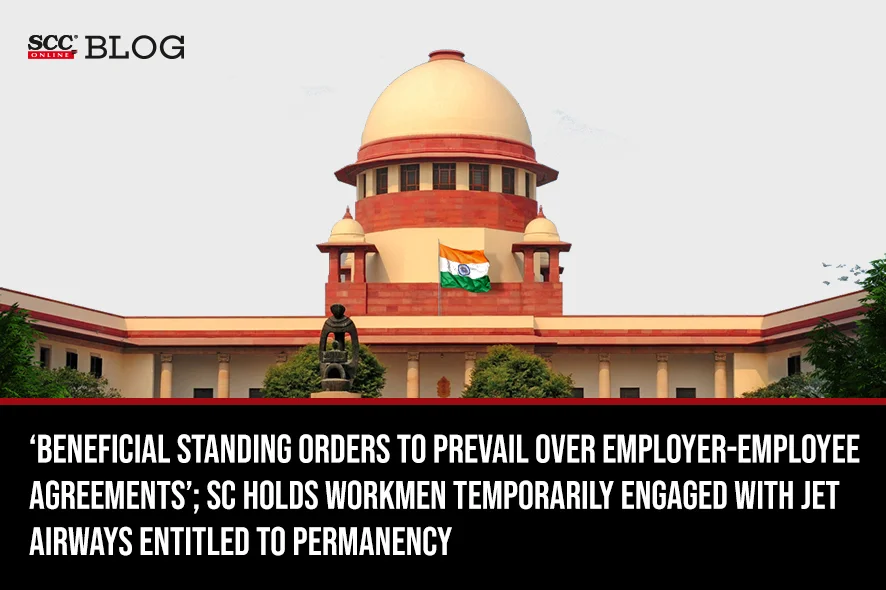Supreme Court: In an appeal against judgment passed by Bombay High Court confirming award passed by the Central Government Industrial Tribunal (‘CGIT’) on 30-03-2017 rejecting the demand of Bharatiya Kamgar Karmachari Mahasangh (‘Union’) for reinstatement with full back wages, the Division Bench of Abhay S. Oka and Sanjay Karol, JJ. upheld the benefits which the Union was entitled to and set aside the said award and its confirmation.
Background
Jet Airways is a renowned commercial airline and the Union represented 169 workmen temporarily engaged by Jet Airways on a fixed-term contract in various cadres like loader-cum-cleaners, drivers and operators. The Union contended that workmen were treated as temporary even after completing 240 days in service in accordance with the Model Standing Order under Bombay Industrial Employment (Standing Orders) Rules, 1959 (‘1959 Rules’) and the nature of work being permanent and regular. The Union raised a charter of demands wherein, the Union gave up permanency demands, which was negotiated upon and led to settlement dated 2-05-2002 that conferred many benefits on workmen giving up the demand. Jet Airways claimed that workers were not entitled to permanency as per the said settlement.
Impugned Order by CGIT
The workmen raised disputes and matter came up for adjudication. In the impugned award, CGIT framed the issue of whether the Union’s demand for re-employment/reinstatement of 169 workmen in service with full back wages was just and proper, and answered the same negatively. It further relied on Section 25-H of the Industrial Disputes Act, 1947 and held that there was no retrenchment because non-renewal of fixed term contract did not amount as per Section 2(oo)(bb) and there was no question of re-employment.
Court’s Analysis
• Issue 1 – Which is the appropriate authority empowered to issue the Standing Orders under the Industrial Employment (Standing Orders) Act, 1946 (‘1946 Act’)?
The Court scrutinized the applicability of 1946 Act in terms of industrial establishments and the appropriate government empowered to govern them. The 1959 Rules were issued by the State while exercising powers under Section 15 of 1946 Act. The Court clarified that for Jet Airways in the instant matter, the appropriate government was not Central but State since Jet Airways was not under Central Government’s control. Therefore, the 1959 Rules would be applicable to the parties in the instant matter as upheld by the Court.
• Issue 2 – Whether private agreement/settlement between the parties would override the Standing Order?
The Court hinted towards several previous occasions when the Court observed about the certified standing orders having statutory force and implying a contract between employer and workman, who cannot enter into an overriding statutory contract already embodied in the certified standing orders. The Court specifically relied on three-judge bench decision in U.P. SEB v. Hari Shankar Jain, (1978) 4 SCC 16 wherein, it was laid down that the 1946 Act was specially designed
-
to define the terms of employment of workmen in industrial establishments,
-
to give the workmen a collective voice in determining the terms of employment, and
-
to subject the terms of employment to the scrutiny of quasi-judicial authorities by the application of the test of fairness and reasonableness.
The Court regarded the 1946 Act as a special Act expressly and exclusively dealing with the schedule-enumerated conditions of service of workmen in industrial establishments, giving recognition and form to workmen’s hard-won and precious rights.
The Court further relied on and referred to Sudhir Chandra Sarkar v. Tata Iron and Steel Co. Ltd., (1984) 3 SCC 369 and Western India Match Co. Ltd. v. Workmen, (1974) 3 SCC 330 discussing the letter and spirit of the 1946 Act. It further cited Rasiklal Vaghajibhai Patel v. Ahmedabad Municipal Corpn., (1985) 2 SCC 35 wherein the Court relied on Western India Match Co. Ltd. v. Workmen, (1974) 3 SCC 330 to hold that “any condition of service, if inconsistent with certified standing orders, would not prevail, as the certified standing orders would have precedence over all such agreements. Any settlement, the employee Union enters into with the Employer would not override the Model Standing Order, unless it is more beneficial to the employees.”
The Court perused the decision of CGIT and its confirmation by the High Court and disagreed with their findings. The Court re-analysed the relevant clauses of 1959 Rules, particularly Clause 4C and Clause 32 which revealed that “a workman who has worked for 240 days in an establishment would be entitled to be made permanent, and no contract/settlement which abridges such a right can be agreed upon, let alone be binding. The Act being the beneficial legislation provides that any agreement/contract/settlement wherein the rights of the employees are waived off would not override the Standing Orders.”
The Court refrained from commenting over the insolvency proceedings initiated against Jet Airways and allowed the instant appeal. The Court held the Union entitled to the benefits as per 1959 Rules while quashing and setting aside the award passed by CGIT and its confirmation by the High Court.
[Bharatiya Kamgar Karmachari Mahasangh v. Jet Airways Ltd., 2023 SCC OnLine SC 872, decided on 25-07-2023]
Judgment by: Justice Sanjay Karol
Advocates who appeared in this case :
For Appellants: Senior Advocate Sanjay Singhvi, Advocate Nitin S. Tambwekar, Advocate on Record Seshatalpa Sai Bandaru;
For Respondents: Advocate Ujjwal A. Rana, Advocate Himanshu Mehta.







